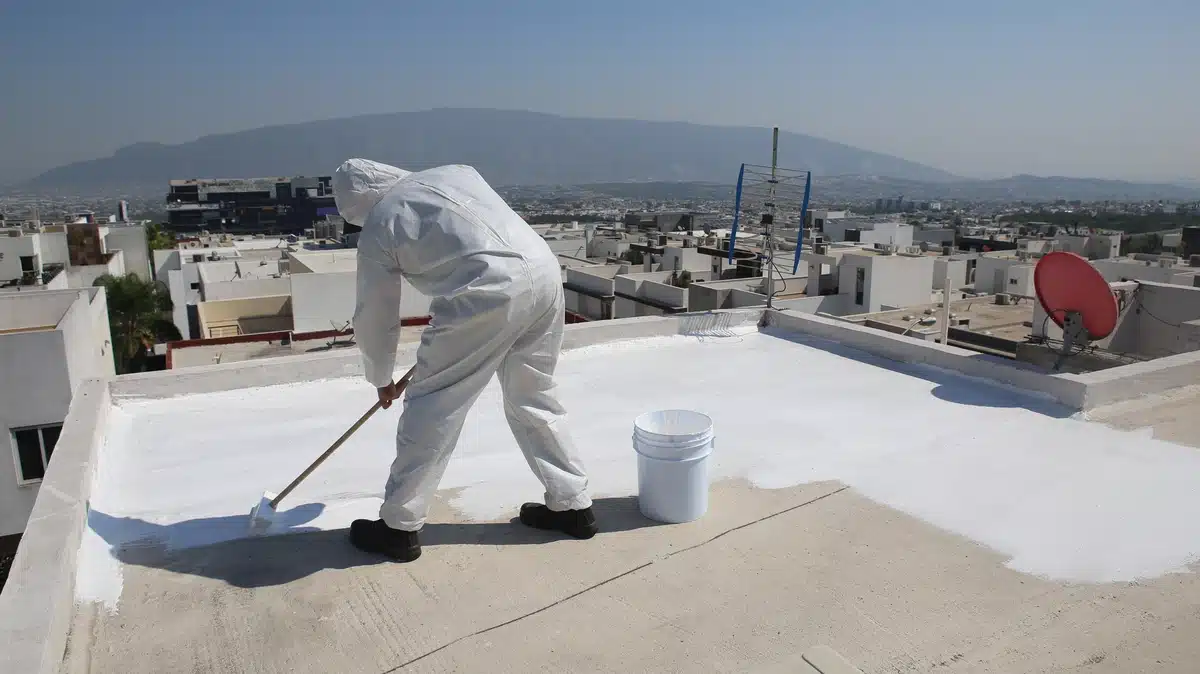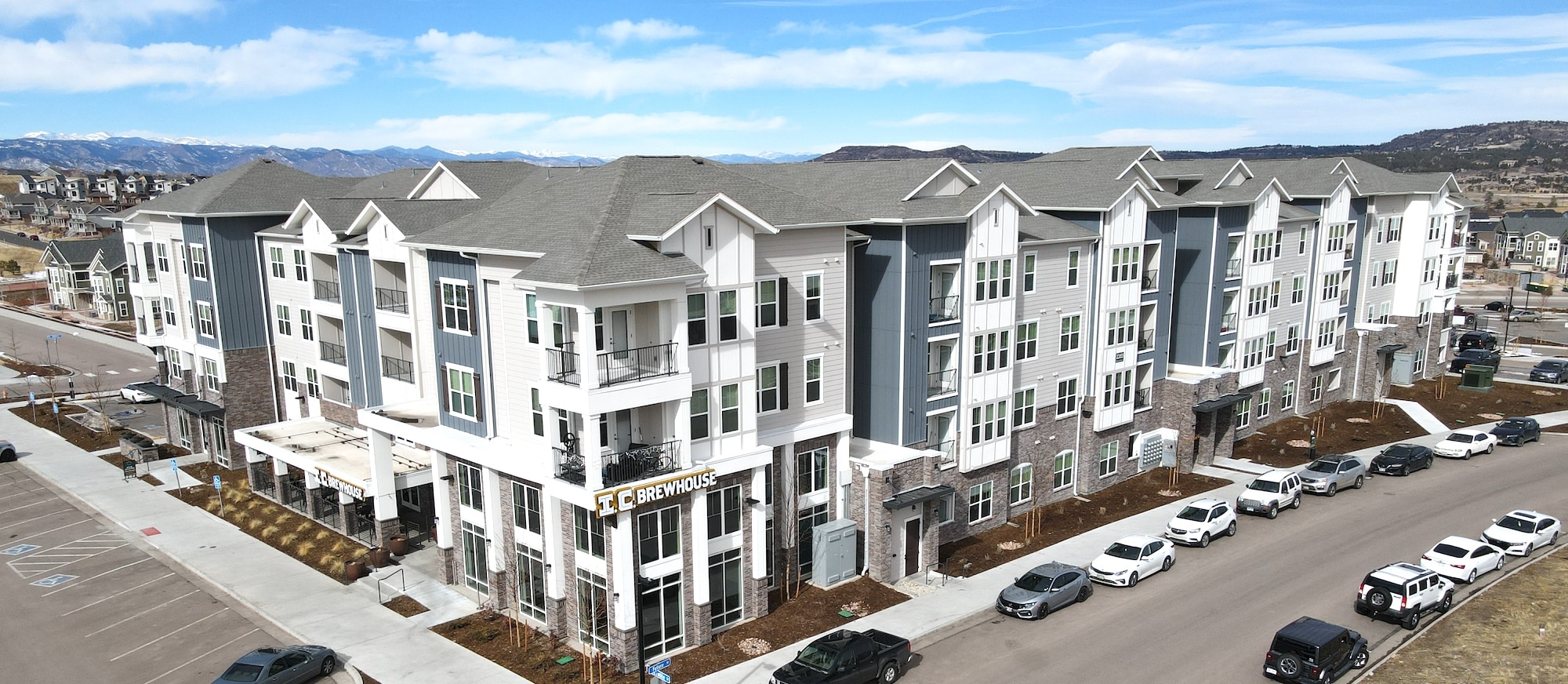Table of Contents
3 Best Silicone Roof Coatings (Pros & Cons)
How legitimate are commercial roof coatings?
And which is the best roof coating?
The answer has a lot to do with the quality of each roof coating product, the quality of installation, and other details that are important to pay attention to when considering how best to protect your commercial business and your flat roofing system.
Not all silicone roof coatings are created equal.
The best silicone roof coatings can add years to the life of your commercial roof, supplying an instrumental layer of protection against water damage and general wear and tear. In this article, we seek to answer, ‘what is the best silicone roof coating?’ and dive into its impact on flat roof longevity.
3 Best Silicone Roof Coatings (Pros & Cons)
How legitimate are commercial roof coatings? And which is the best roof coating? The answer has a lot to do with the quality of each roof coating product, the quality of installation, and other details that are important to pay attention to when considering how best to protect your commercial business and flat roofing system.
Not all silicone roof coatings are created equal. The 3 Best Silicone Roof Coatings (Pros & Cons) can add years to the life of your commercial roof, supplying an instrumental layer of protection against water damage and general wear and tear. In this article, we seek to answer, ‘what are the 3 Best Silicone Roof Coatings (Pros & Cons)?’ and dive into their impact on flat roof longevity.
For your own commercial roofing services, reach out!
But in the meantime, check out this short video for an overview and visual of 3 Best Silicone Roof Coatings (Pros & Cons):
Silicone for Commercial Buildings
If you own a commercial building with a flat roof, you may want to consider a silicone roof coating. While these coatings are optional, they can help reduce roofing costs in the long run. Choosing one of the 3 Best Silicone Roof Coatings (Pros & Cons) ensures maximum durability and performance.
What Is a Silicone Roof Coating?
Silicone coating is a highly flexible polymer roof material. It starts as a liquid and is either rolled or sprayed onto the roof. Once applied, the silicone fills cracks and creates a tight seal. Some of the 3 Best Silicone Roof Coatings (Pros & Cons) may require multiple coats, but all form a durable barrier to water and debris once cured.
Benefits of Silicone Roof Coatings
Silicone coatings provide a tough and protective barrier. Here are some of the benefits that come with the 3 Best Silicone Roof Coatings (Pros & Cons):
1. They Are Erosion-Resistant
Silicone roof coatings do not wear down with exposure to the elements, ensuring your roof lasts longer. This is one of the reasons why the 3 Best Silicone Roof Coatings (Pros & Cons) are a top choice for commercial flat roofs.
2. They Can Reduce Cooling Costs
Flat commercial roofs often get full sun exposure. Silicone coatings, particularly from the 3 Best Silicone Roof Coatings (Pros & Cons), insulate your roof from the sun and lower indoor temperatures, reducing cooling costs.
3. They Are Environmentally Friendly
Silicone coatings, especially high-solid formulations, are environmentally friendly. The 3 Best Silicone Roof Coatings (Pros & Cons) often have fewer volatile organic compounds (VOCs) and solvents, making them a greener choice.
4. They Resist Ponding Water
Ponding water is a common issue with flat roofs. The 3 Best Silicone Roof Coatings (Pros & Cons) are resistant to ponding water and prevent leaks by maintaining their integrity under water.
5. They Resist Mold and Mildew
Silicone coatings resist mold, mildew, and algae growth, which minimizes maintenance and ensures the roof remains intact for years.
6. They Apply Easily
The 3 Best Silicone Roof Coatings (Pros & Cons) are simple to apply, requiring less time and labor, making them a convenient option for busy commercial properties.
Challenges of Silicone Roof Coatings
While the 3 Best Silicone Roof Coatings (Pros & Cons) have numerous benefits, they may not suit all roof types or situations.
Not Ideal for Sloped Roofs
Silicone coatings are primarily for flat or low-slope roofs. If you have a steep-sloped roof, acrylic coatings may be a better fit.
Dirt Accumulation
Silicone coatings can collect dirt and dust, reducing their reflective properties. Regular cleaning mitigates this issue, ensuring the 3 Best Silicone Roof Coatings (Pros & Cons) continue to perform well.
Slippery Surface
Silicone coatings can become slippery, especially when wet. Some of the 3 Best Silicone Roof Coatings (Pros & Cons) offer modified formulas to create walking paths for better safety.
Our Top Picks for the 3 Best Silicone Roof Coatings (Pros & Cons)
- Henry Pro-Grade®
- Features: Up to 20-year warranty, ENERGY STAR® Certified, ponding water resistance, ultra-low VOC.
- Pros: Long-lasting protection and eco-friendly formulation.
- Cons: Requires professional application.
- GacoFlex Silicone Roof Coatings
- Features: Seamless membrane for weathered roofs, protection against ponding water, UV light, and severe weather.
- Pros: Versatile application on most roofing surfaces.
- Cons: Dirt accumulation requires regular cleaning.

- Mule-Hide Products
- Features: Compatible with metal, EPDM, TPO, and more, provides low-maintenance watertight performance.
- Pros: Ideal for restoring a wide array of substrates.
- Cons: May require professional expertise for proper application.
Get the Best Commercial Roof Coating for You
The 3 Best Silicone Roof Coatings (Pros & Cons) can be instrumental in keeping your flat roof in top shape. They protect against erosion, leakage, and mold growth, ensuring the longevity of your commercial roofing system.
Even if silicone roof coatings aren’t ideal for your situation, other roofing products and procedures can help protect your roof.
For expert advice, inspection, or installation, reach out to Tectum Roofing. We can guide you in choosing from the 3 Best Silicone Roof Coatings (Pros & Cons) and find the perfect roofing solution for your business.
Contact us today to learn more!
Silicone for Commercial Buildings
If you own a commercial building with a flat roof, you may want to consider a silicone roof coating. While these coatings are optional, they can help you end up with fewer roofing costs in the long run.
What Is a Silicone Roof Coating?
Silicone coating is a highly flexible polymer roof material.
You can find several different mixtures on the market. It starts as a liquid, and the roofer rolls it out or sprays it onto the roof. The silicone fills cracks and makes a tight seal.
Some brands of silicone roof coating may require multiple coatings. Eventually, the silicone material cures and becomes a barrier to water and debris.
What Are the Benefits of Silicone Roof Coatings?
Silicone coatings provide a tough and protective barrier. Here are some of the benefits of a silicone coating on your commercial roof.
They Are Erosion-Resistant

Silicone roof coatings do not wear down with the elements. You won’t have concerns about premature roof wear and early replacement.
They Can Reduce Cooling Costs
Flat commercial roofs often get full sun exposure which could cause indoor temperatures to rise. Properly applied, the silicone coating will insulate your roof from the sun and keep indoor temperatures low.
They Are Environmentally Friendly
Silicone roof coatings are environmentally friendly in general. If you want to go further, then high-solid coatings are the best in this regard. These tend to have fewer volatile organic compounds and solvents.
They Are Resistant to Ponding Water
Once the material cures, you will find that it works well to protect your roof from water ponds on the flat surface. The roof can handle the water without the coating getting soft. However, this does not take the place of good roof drainage.
They Resist Mold and Mildew
Organic materials, like molds, mildew, and algae, don’t grow on the silicone material. You will spend less time with roof maintenance since you will not need to worry about organic materials degrading the roof.
They Apply Easily
Silicone roof coatings are easy to apply and don’t require a lot of time and labor to do it. You won’t have to worry about workers on your roof for long periods.
What Situations Are Not Ideal for Silicone Roof Coatings?

While silicone roof coatings have many benefits, they are not perfect for all roof situations. However, if you work with an expert roof contractor, they can minimize many of these issues. Here are some examples of the challenges of silicone roof coatings.
They Are Not Good For Slope Roofs
Silicone coatings don’t work well if you have a slanted roof such as those on most homes. If your roof has a steep slope, you may want to try a different coating like acrylic.
They Tend to Accumulate Dirt
Silicone coatings tend to accumulate the daily dirt and dust that settles on them. Over time, the dirt and dust will cause your roof to absorb more and more of the sun’s rays and will negate the coating’s reflective properties. Regular cleaning will keep this problem to a minimum.
They Aren’t Good for People to Walk On
If you regularly have people walk on your roof, you will need a modified version of the coating. Silicone coatings are slippery, especially when wet. However, you can mitigate this problem with a special silicone used to create a path for walking.
Our Top Picks for the Best Silicone Roof Coatings – Highest Rated
- Henry Pro-Grade® – “Up to 20-year Material, Labor & Workmanship Gold Seal systems warranty. ENERGY STAR® Certified, Permanent ponding water resistance, Ultra-low VOC, High solids, NSF P151 approved for rainwater catchment, For professional use only” – Henry.com
- GacoFlex Silicone Roof Coatings – “Provide a proven, guaranteed solution for renewing your weathered roof. They can be applied to virtually any existing roofing surface to create a seamless membrane that protects against permanent ponding water, ultraviolet light and severe weather.” Gaco.com
- Mule-Hide Products – “Can be used to restore and repair a wide variety of roofing substrates, delivering low-maintenance, watertight performance and significantly delaying the need for costly and disruptive tear-offs. The coatings can be applied to a wide array of roofing substrates, including metal, EPDM, TPO, aged PVC, aged acrylic coatings, concrete, asphalt built-up roofs, granulated modified bitumen roofs and new spray-applied polyurethane foam.” – RoofingMagazine.com

Get the Best Commercial Roof Coating for You
We know how crucial it is to protect your roof and your business.
The right silicone roof coating can be instrumental in keeping your flat roof in top shape, protecting it from erosion, leakage, and mold growth. Even if a silicone roof coating is not helpful in your case, you can still protect your roof with other products and procedures.
For information, inspection, or installation, reach out to the professionals.
Tectum Roofing can advise you on what the best silicone roof coating will be in your case. Give us a call, and we will find a roofing solution for your needs.



